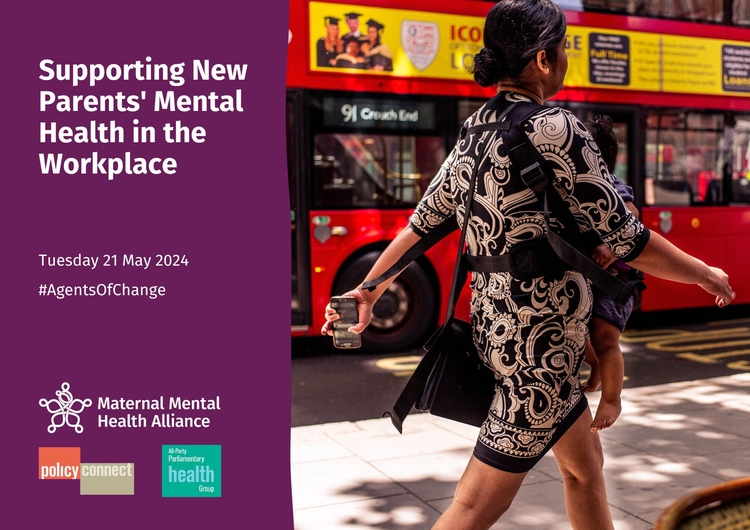Posted By: Rachael Jordan
12th June 2024
4 minute read

On Tuesday 21st May, the House of Lords was home to the beginning of our 'Agents of Change' programme, aimed at breaking the pervasive silence around perinatal mental health in the workplace. The MMHA, in partnership with Policy Connect and the All-Party Parliamentary Health Group (APHG), convened a diverse set of minds to discuss the mental health needs of working people during the transition into parenthood, and how businesses can provide better support.
Work can be a major part of daily life and when becoming a parent, it can be another barrier to overcome. The narratives around parenting and work are often negative, and for good reason. You only need to search online for phrases like 'the Motherhood penalty' or 'the Motherhood gap' to see the data, read the stories and find out why this is the case.
Progress is slow, and despite the increased (and much-needed) conversation around reproductive and other physical health needs at various stages in a person's life, we see a continual silence around mental health at these same life stages.
We learned that the workplace has the opportunity to make or break the experience of early parenthood.
Rachael Jordan, Director of Marketing & Partnerships, MMHA
The Roundtable brought together a wide range of people, experiences and expertise. We were incredibly grateful for our wonderful panel, representing the perspectives of parents, the third sector, academia, healthcare, policy, and business leadership. Each were given equal weight and time to discuss where we are today and where change is needed to better support new parents' and their mental health at work.
This intersectional approach, with real and lived experience at it's heart, is how we have always worked at the Maternal Mental Health Alliance and it's how we will continue to advocate for and drive change.
You could say we 'Alliance'd it'.
There are two sides to this coin. Workplace factors can exacerbate perinatal mental health problems or push parents, namely mothers, out of the workforce entirely. Where culture, maternity management processes and parental policies are insufficient, or there is a lack of awareness or understanding at work, new parents can be discouraged from disclosing how unwell they feel.
We know from existing research that 70% of new mothers will hide or underplay their symptoms and when at least 1 in 5 women experience some form of perinatal mental health problem, a significant proportion of your workforce may be silently suffering.
But for some, the matrescence journey can be an incredibly empowering and productive chapter of their lives from a professional perspective. The mean age of a female entrepreneur in the UK is 33, with many women tapping into this entrepreneurial power directly after becoming a mother. This is something initiatives such as the 'Invest in Women Taskforce' are looking to encourage and support even further.
A survey by our Insights Partner, Wish I'd Known, in May 2024 found that across 488 UK parents (95% mothers) of under 3s, 2 out of 5 working parents said they would not feel comfortable talking to anyone at work about their mental health. For those open to sharing, colleagues or peers are the go-to.
Early intervention is crucial and the workplace must adapt to help new parents feel comfortable talking about their mental health at work, whether that conversation happens with colleagues, line managers, Mental Health First Aiders or HR.
Parents will talk more if they feel that there is a culture of understanding and if they feel like they will be heard and supported. Talking more helps early intervention, which is crucial and can prevent suffering. Perinatal mental health is a pathway and there is a missed opportunity today to spot people who are at the beginning of that pathway. The communities around new parents, including those in the workplace, need to recognise early signs and we need to empower women to talk about their mental health.
Hearing from the experiences of mothers offered some real insights into the simplicity of some of the steps that can be taken to better support new parents at work, including:
We've heard many times that the absence of perinatal mental health from the workplace - from conversation, wellbeing provisions, processes, to not even acknowledging the words or the fact it exists - signals to new parents that 'it's not ok to talk about this here'.
Rachael Jordan, Director of Marketing & Partnerships, MMHA
There's a wealth of expertise in the third sector and employers have an opportunity to partner with organisations to set a new standard of mental health support for parents. Together, we can be Agents of Change and define best practice, lead by example and collectively improve, even save, lives.